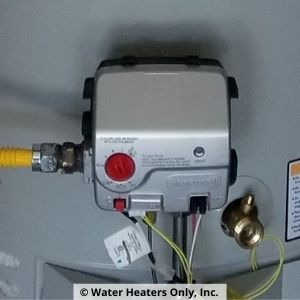Colder temperatures can cause water heater problems
Did you know that cold weather can cause problems with your water heater? That’s right: Colder temperatures can affect your water heater. Yes, we know that we are talking about Phoenix, but the fact is that while daytime temperatures may stay in the mid to high 60’s, overnight temperatures can drop down to 44 degrees or colder, depending on where you live. And when the temperature drops, the air surrounding the water heater and, more importantly, the groundwater gets colder as well and this can cause problems for your water heater.
What is the connection between colder temperatures and water heater problems? For starters, if the water entering the water heater is colder, the water heater will have to work harder to get the water up to the desired temperature. If it is an older water heater, this could cause the water heater to malfunction or even start leaking. However, even if you have a newer water heater, the colder groundwater may cause you to lose hot water sooner and it may take longer to get your hot water back. This is due to what is known as the “recovery rate”. The recovery rate is how much hot water a water heater can provide in the first hour after being drained of all its hot water. If the incoming water is colder than usual, it may take longer.
So, what can be done to help avoid some of these problems caused by colder temperatures? One of the first things we recommend when the weather turns cold, especially if you find yourself with a lack of hot water, is to turn up the temperature on the thermostat on your water heater. On a gas water heater, the thermostat is on the metal box on the front-lower portion of your water heater. It will typically have a red knob with the letters A,B and C on it. The temperature increases from A to C with C usually being the hottest. For electric water heaters, you will have to take off the front panel to access the thermostat and turn it up with a screwdriver. Be careful when doing this as you may set the water temperature too high and that could lead to scalding. Just turn it up a little at a time and test the temperature at a faucet in the home.
Here are two examples of typical thermostats on a gas water heater:
To adjust your thermostat properly, always consult your owner’s manual. However, if you’re not comfortable and would like some help, just give us a call and we will be happy to answer any questions you may have.
Though turning up the temperature on your water heater can help, that is not the only thing we recommend doing to make sure you have plenty of hot water in the colder months. Here are some other helpful tips to help keep you in hot water throughout the winter season:

- Make sure your pipes are insulated, especially the hot and cold lines attached directly to the water heater. Water Heaters Only, Inc. always adds insulation as part of our standard installation. You should also consider making sure the water pipes running under the home are insulated as well.
- If your water heater is located in the garage or an outside shed or closet, you may want to check that the area is as warm as possible. That doesn’t mean installing a heater, but you should check for drafts that could make the ambient air around the water heater colder.
- If you haven’t done it recently, you should consider flushing out the sediment from your water heater. This is recommended to do once a year and that’s because a buildup of sediment will make your water heater work harder to heat the water and it could eventually lead to less hot water as the sediment takes up more room in the water heater. If your water heater is already working harder due to sediment buildup and then the water gets even colder, that could cause further problems. If you don’t know how to flush your water heater, just give us a call and we will be happy to set up an appointment or give you help over the phone.
We hope this has been helpful and we would like to leave you with one last important tip: Check the age of your water heater! If it is over 15 years old, the colder weather may cause the water heater to fail completely so you might just consider replacing it before you wake up to a cold morning AND a cold shower. If you don’t know how to check the age of your water heater, go to our blog post about ratings plates here. There you will find the information you need to determine the age of your water heater. Of course, you can always call us at 1-800-835-0077 24 hours day, 7 days a week with any questions you may have or to set up an appointment with one of our water heater technicians.

 Rated 4.8 Out Of 5 Stars
Rated 4.8 Out Of 5 Stars
